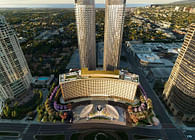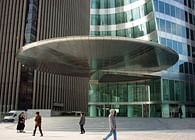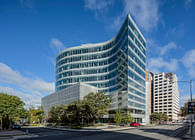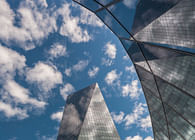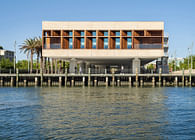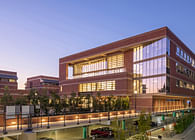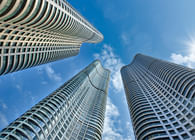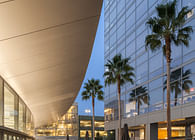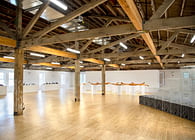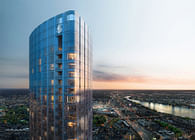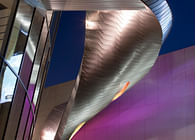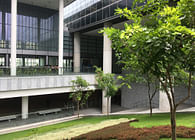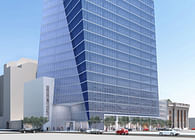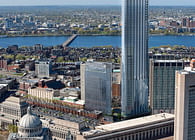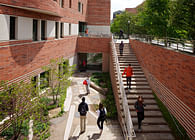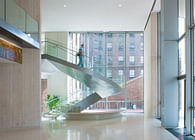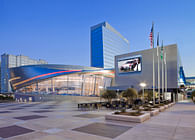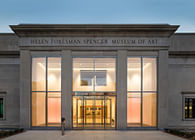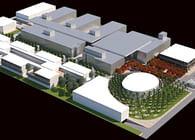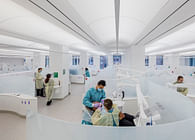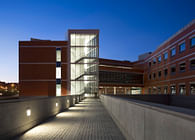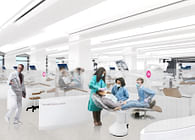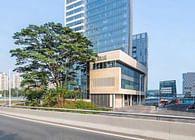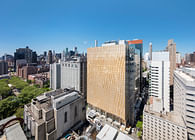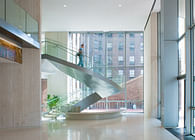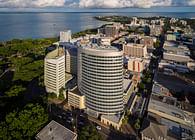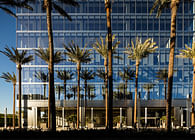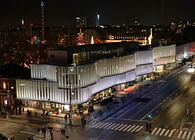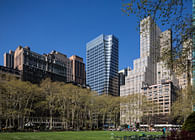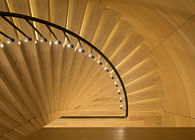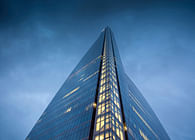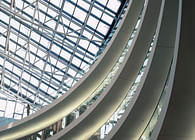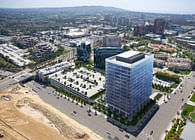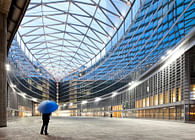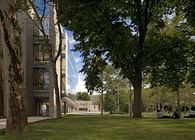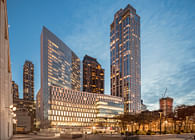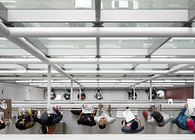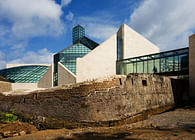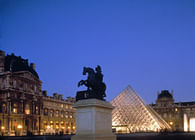
On an elevated site, Milstein Family Heart Center bows gently outward toward the view, drawing attention to the extraordinary landscape of the Hudson River and New Jersey Palisades beyond.
Despite the necessary density of the plan, natural light is plentifully present in the interior. With its flanking neighbors, the new building reads as part of an ensemble of different but complementary parts.
Diagnostics, ambulatory surgery, cardiac catheterization laboratories, medical practice suites, critical care units, and an education/conference center have been added to the existing facility. The continuity of medical departments and functional synergies are facilitated with multi-level connection. The resulting seamless complex provides an exceptional platform for the focused work of medical professionals while welcoming the visiting public through inviting portals and transparent glass walls.
The spaces in which patients wait before undergoing sensitive surgical procedures are enclosed by a climate wall, designed to admit maximum natural light, optimizing views while protecting the interior from excessive solar gain in summer and excessive heat loss in winter. The solar vanes in the three-foot-wide cavity track the movement of the sun and forestall excessive solar radiation into the interior. Exhaust air from the building is conducted up through this cavity and released at its top.
Extending the theme of the building’s exterior, paintings from the Hudson River School have been interpreted into large-scale wall murals. Abstracted by a radical shift of scale, the images impart a sense of depth and tonal richness to the interior.
To emphasize transparency, the entire gravity load of the four-story facade is suspended from the roof by a system of stainless steel rods. The durability and transparency of the building’s defining glass feature dissolves the barrier between occupants and the exterior environment. The material palette—water-white glass, stainless steel, aluminum, and travertine—promotes a sense of lightness, clarity, and durability, consonant with the institution’s underlying purpose.
SITE: 165th Street and Fort Washington Avenue
COMPONENTS: Radiology, diagnostics, ambulatory surgery, cardiac catheterization laboratories, operating rooms and recovery; critical care units, medical practice suites; education/conference center with 200-seat auditorium
CLIENT: NewYork-Presbyterian Hospital
PCF&P SERVICES: Architecture, exterior envelope, interior design
SUSTAINABILITY: LEED Gold Certified
AWARDS
American Architecture Award
Chicago Athenaeum / European Centre, 2011
Design Awards: Citation
American Institute of Architects, New York State Chapter, 2012
Green Good Design Award: Architecture
Chicago Athenaeum / European Centre, 2012
Platinum Award for Engineering Excellence
American Council of Engineering Companies of New York, 2011
Best of 2009 Awards: Award of Merit
McGraw Hill, 2009
Status: Built
Location: New York, NY, US
Firm Role: Architect
Additional Credits: Associate Architect: daSilva Architects, New York
Hospital and Ambulatory Planner: MPRI - Medical Planning Research International, Pelham, NY
Structural: Thornton-Tomsetti Group, Inc., New York, NY
Mechanical / Electrical / Plumbing: Syska Hennessy Group, New York
Landscape: Pei Cobb Freed & Partners
Interiors: Pei Cobb Freed & Partners
Images: PCF&P, Pei Cobb Freed & Partners, Andy Ryan Photography, courtesy of W&W Glass, Paul Warchol
